 Review in short:
Review in short:
Go buy and read it no matter of your personal tastes. This book won’t disappoint.
I have a bunch of notes scattered around and I’m not sure if I can put them together in a coherent way. In part because my opinion changed through the course of the book. I usually just need a few pages to form a good idea. 30 pages of Glen Cook’s Black Company were enough to give me a precise idea of what I was going to read, same for Donaldson’s first book in the Gap series (just to name two I’ve read recently). With this one instead it was different and only starting form Part 2 (about 200 pages into the book) I started to truly like it. Then it was a steady crescendo.
Some general infos: The Blade Itself is a first book in a trilogy already completed (the third book is due out soon in the UK) and a debut of a relatively young writer (early thirties). Kind of a “modern” fantasy. It has the different POVs written in third person but still as a subjective view, as is habit nowadays, and is (feels) very far from the “already seen”. Feels “fresh”, actual. The overall plot itself doesn’t shine in originality, but I think it’s a misleading element. I also read some reviews about the book before I start reading it and all of them said it was the old plot, old characters but with a funny and original twist. This is true but misleading. It’s not the way the book feels. It’s not just a critical approach to a tired and stale genre, it’s not a “what if” or a simple exercise revolving around a gimmick. You don’t have to have fantasy knowledge to appreciate the style Abercrombie gives to old ideas. Instead it stands on its own. This book is awesome and just doesn’t need and doesn’t want to be compared to something else in order to spill its own value. It’s not good in relation to something else, it is good on its own.
The point being that throughout the book I didn’t thought at this sublayer of wit. I didn’t felt detached enough to give it the cold analysis. Instead it worked on the emotional side. And moving toward the end I really cared for the characters, felt the story emotionally, and I couldn’t-care-less about the supposed academical exercise about “old fantasy cliches with new twists”.
I define it “modern” in the sense of mastery. Take for example the current TV series. Sometimes lacking in ideas, but the *writing* itself today is much more developed and effective. There has been tangible progress. The pacing, the sharp conversations, the wit. These abstract aspects taken from television carry over to this book. It is far from the archaic feel of Tolkien, of the evocation of distant worlds. It is instead modern, sparky, fresh. It is also written with the knowledge of the culture, so those kind of stereotypical situations that appear in the book are always surprising because you never know in which direction the writer will drive them. There was one review that said “It’s written with more wit than most writers use in their entire career” and it is true. There is no filler in the book and every page brings on something ingenious to the point that you wonder if the author can really keep up this pacing throughout.
So the pacing. When I started reading I was skeptical. Very skeptical. A new author, so I started to nitpick things, imagining flaws, criticizing in my head every page, every description. 100 pages in, I was not impressed. Funny, witty, yes. But not impressed. It seemed to go nowhere, the characters were interesting but I still looked at them with a very detached eye. I was amused, but not involved. You know, reading with a kind of air of superiority. The book didn’t seem that good. Felt a writer who was trying hard, but too hard. Like falling short of the point. Good try, slap on the shoulder.
Why it changed then? Is the remaining of the book so much better that it surprised me? Not really. There are no sharp turns or sudden improvements of quality. The book, as I said, is uniform and with a steady crescendo. What was different is that I started “caring” and felt there. I stopped criticizing, I stopped caring about picking (imaginary) flaws and just was carried away in the story.
Now this may be a personal thing, but there are some objective considerations to make. The beginning wants to be fast and catching, but suffers of its own structure. There are a few different POVs as is typical of “modern” fantasy but the scenes are brief so you read very small chunks of different stories and this makes kind of hard to get involved and absorbed into them. It feels fragmentary. You need to wait at least 200 pages before some threads come together, till you discover that the small chunks all belong to the same plot, like branches of a river. On the other side there’s something “catching” even if you don’t know enough of the story, the characters and the scenes. That pays back and entertains while you wait to grasp what is going on as the situations are fun and witty, with characters sharply characterized and so dissimilar that it’s hard to favor one or the other. They are just impossible to compare and seem to belong to entirely different stories and styles (which is a manifest purpose of the writer: give each POV its own style, even in the writing).
So this fragmentation didn’t help to get hooked into the story. It’s hard to feel there when you don’t see “the point” and the scenes feel disconnected. At the same time, now that I read the whole book, I don’t think it’s a “flaw”. It’s just a structural weakness of what the author wanted to do, but I don’t think it could have been done better. It even becomes a theme in the book. Quoting:
If you’re going to travel with a man, and maybe fight alongside him, It’s best to talk, and laugh if you can. That way you can get an understanding, and then a trust. Trust is what binds a band together, and out there in the wilds that can make the difference between living or dying. Building that kind of trust takes time, and effort.
This is a autoreferential metaphor for the reader and the book, how both need time to slowly develop that kind of “friendship”.
The other particular aspect is that the book feels like theater. This is a strong impression that I had while reading. There are writers, think for example Jordan, that follow their characters all the way. The narrative is continue and it’s like the writer never leaves them. It flows in detail. Abercrombie is the exact opposite of this. The whole book is structured in relatively brief scenes, with one setting. You don’t get to follow the various characters, instead you have small slices of their lives, taken at critical points. You don’t get to follow them, you read instead just about key moments and scenes that drive the plot and character development.
This aspect is important because it defines a particular approach that you read about in every other review. You can easily detach the characters (live actors) from the background scenography, that is static. Often the scenes take place into a single room or another symbolic space, and when the scene is over the whole setting disappears and is replaced. Ceases to exist. Feels like you are watching theater, live actor with scenery in the background, with relatively short but significant moments represented. Like Shakespeare made fantasy and prose, but with the distillation of meaning, so that you get no “filler” that is typical of epic fantasy plots. Everything superfluous is chopped off.
It is meaningful because, as others would say, Abercrombie isn’t the worldbuilder writer. You aren’t here to read about secondary worlds with complex history, you aren’t here for that emergent layer. That’s treated as scenery. It’s just the set-up, where the strong point is instead about the live actors. The characters, the introspection, the witty, sharp conversations, the black humor, the sarcasm. It’s all very effective and gives the classic fantasy setup a refreshing feel.
The story starts spread out, then gets together, spreads out again before the end. In the latter chapters the writer does some showmanship, instead of binding one scene and chapter to one POV, he chains them. This is fantastic. You basically see the exact same scene from the various POV (so short paragraphs) that you got to know through the book. One after the other, in the same scene. There’s no repetition, you don’t get the next POV re-telling the same you just read, but the time is instead continuous, flows, and yet you see how much the different POV completely twists the perception of the story. This is pure mastery, from a side you recognize how each character definitely has an unique voice and is perfectly defined, from the other it makes the read compelling, never slogging, and all part of the crescendo.
I start reading and thought the writer was good but average. When I reached the end I simply thought that I don’t have any right to criticize him. He isn’t a good writer, he is one of the very best. He isn’t a young writer trying to do something with his first novel, he’s already a worthy “first tier”. He is no rookie, no need to improve. He is an excellent writer and surprising too.
One critique I have on my notes and that I still find valid, from the perspective of the writing, is about the “retrofitting”. There are two different kinds of writers, those who give you just a summary of the action, and those who describe a battle blow by blow, precisedly described. Abercrombie falls in the latter and is rather good at it. Only flaw for me as a reader is that, while the action is consistent, I still had some difficulties to follow it, so had to reread a few passages to have them clear in my mind. The problem with this is a kind of uneven balance in the way he describes things. So sometimes there’s a lack of focus on what’s more important and not enough on some minor element, with the consequence that the “picture” in the mind of the reader comes confused if not corrected.
I can compare this quirk with Jordan as I recently read it. With Jordan I’m never confused. When I read I picture a scene in my mind, with the elements described. It’s something automatic. Sometimes I don’t notice consciously elements I put in my picture, then I go check and they are there in the text too. For example the book may described a scene in a big room, and I have it in my mind, then I notice the picture I have has the room with a domed ceiling. I don’t remember if I imagined it or read in the description but when I go checking the text I notice it’s there. As I said Jordan is always perfectly consistent. I never need to correct the picture I had, I never need to “reposition” characters on a scene because one I pictured on the right is instead on the left or behind. With Abercrombie instead I have some problems. While he is consistent, as I said, he is more confusing. Just as an example he may start to describe the rain in a paragraph, then describe the woods in the next. The characters are in the woods and it’s raining, but it’s more difficult forming the picture if you think of the rain, then have to add the woods. I’d give more “weight” to the woods. And this is a very small example of a writing habit that I found through the book and that not only applies to the descriptions, but also to the plot. The writer never gives more elements than those that are absolutely necessary for that immediate scene. Often you miss huge chunks of both descriptions and plots, that you read later in the book and have to “retrofit” into the Big Picture. It’s not a flaw per se, but I wanted to point it out.
In particular you can take one of the three major POV (but there are a bunch of characters in the book). Logen, as a main character, is vaguely described at the beginning. It’s like you see things in first person perspective. Wihtout a mirror you can’t see yourself (so Logen). And it’s in fact till the second half of the book that you actually have the character physically described. Through the reactions/eyes of other people. While this is again some writing showmanship, you also in this case have to “retrofit” things. You may have imagined Logen in your head in a way, but then only halfway through the book you have more elements that may contradict your arbitrary mental “image”. As a demonstration of this I didn’t like in a special way Logen, but in the second half of the book I was completely in love. One of the very best characters EVER. I was laughing out loud at some passages. He’s great. And yet he’s a kind of barbarian stereotype that you have branded in your memory, and yet he feels like something you never read before.
There’s also a very small POV. A party of characters. Just a few chapters here and there through the course of the book. But it is some of the very best shit I’ve ever read. The most fun fighting and BADASS party ever. I’m out of superlatives but these guys deserve more. Just a few pages and they deserve the price of the book, and I so hope they have more space in the progressing of the story. I don’t want to spoiler but once again they show how good Abercrombie is. Short scenes, a party of characters, and in just a few lines he gives each one splendid, awesome characterization. While the main, more complex POV had to grow on me, with these guys it was love on first sight. They are something special. It’s all about one word: charisma. And tons of it. Make you laugh, and some of the best, yet totally realistic fighting. Brutal, exciting.
So I think I’ve written down everything I have on my notes. The theatrical feel, top notch writer, focus on the character, great emotional involvement for me, but only starting with the second half of the book. Some (many) absolutely A-W-E-S-O-M-E characters, especially smaller ones (like Brother Longfoot and that “party”). One thing I forgot to point out, the “acting” isn’t overly realistic, but made slightly showy and excessive, exactly like theater works. At the same time the characters themselves are totally consistent with themselves, their situation and the setting. So while the whole pictures comes a bit bloated, it’s still absolutely believable.
Oh, and I have this image stuck in my head, Malacus Quai looking like Steve Buscemi.
By the way, the author has the best blog. Updated frequently, informative and funny.
Monday I order the second book through Amazon, along with more books from Erikson. But now I’m going to read something I already have on my pile. Still haven’t decided (likely the second book of the Black Company, as it is a short read).
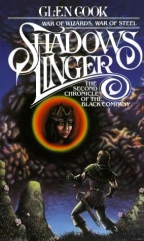 Second book of a trilogy, but also part of a series of ten books in total. I didn’t comment the first book, but I read it. It was wonderful.
Second book of a trilogy, but also part of a series of ten books in total. I didn’t comment the first book, but I read it. It was wonderful.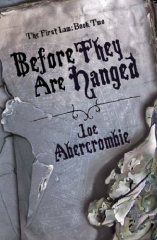
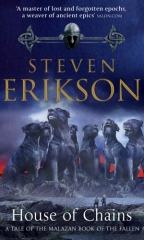
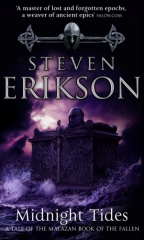
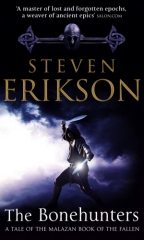
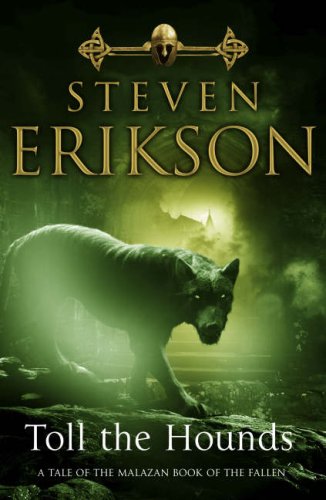

 Review in short:
Review in short: